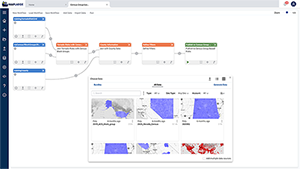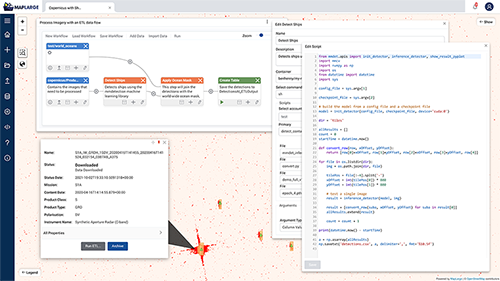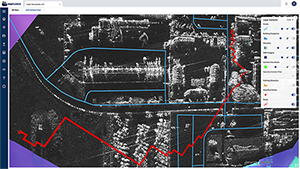Compose workflows to automate your data processing and product pipelines.
Automation of pipelines for geospatial data modeling and Extract, Transform, & Load (ETL) Notebook capabilities allow non-developer users to intuitively interact with a multitude of data sources to construct workflows. ETL workflows capabilities include data cleansing, classification, analytics, queries, and filters across a variety of data types.
Unify Stakeholder Access to Enterprise Data Stores, Lakes, and User Repositories
Enterprises rely on secure and efficient access to their data assets. As organizations evolve, data storage options risk becoming increasingly fragmented across individual user repositories, incompatible micro-services, data stores, and data lakes. MapLarge simplifies access to this otherwise siloed data with federated queries, joins, and other operations on geospatial and non-geospatial data.


Stabilize Data Science Code for Model Lifecycle Management at Scale
Cleaned and normalized data often requires additional transformations to prepare it for use with a data model. ETL workflows can apply additional transformations such as feature selection and feature engineering to increase the model accuracy and reduce computation time. Data Scientists need the capability to code in the tools of their choice and then execute this code in an integrated enterprise workflow for repeatability at production scale. MapLarge natively supports integrations with tools like Jupyter Notebooks, TensorFlow, ML.Net and PyTorch as well as dozens of other tools and frameworks via customizable secure Docker Containers.
Create Flexible Workflows to Ingest, Normalize, Transform, and Share Data Products
Heterogeneous data stores and lakes, especially including geospatial data, require a series of ETL processing steps to prepare feeds for downstream consumption. ETL workflows provide a means to condition the data and increase its compatibility with analytic, machine learning, mapping, visualization, alerting, and tasking tools. ETL processing must keep up with streaming data and the real-time demands of enterprise applications. No-code ETL Workflows enable product managers and domain experts (analysts, operators, engineers, etc.) to efficiently create data products for their end-customers.
